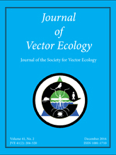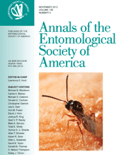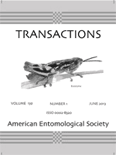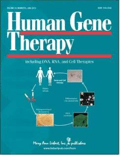
JOURNAL OF VECTOR ECOLOGY
Scope & Guideline
Fostering Collaboration in Vector Ecology Research
Introduction
Aims and Scopes
- Vector Ecology and Behavior:
Research that examines the ecological roles and behaviors of vectors, including their feeding habits, mating systems, and habitat preferences. - Genetic and Molecular Studies:
Studies focusing on the genetic diversity and molecular characterization of vector populations, which aid in understanding their evolution and potential resistance to control measures. - Vector Control and Management:
Innovative approaches and studies related to the control of vector populations, including the effectiveness of insecticides and biological control agents. - Public Health Implications:
Research that connects vector ecology with public health, investigating how environmental changes and vector dynamics influence the transmission of diseases. - Biodiversity and Distribution:
Surveys and assessments of vector species diversity and their geographical distribution, contributing to biodiversity knowledge and conservation efforts.
Trending and Emerging
- Microbiome and Vector Interactions:
Research exploring the microbiome of vectors, such as mosquitoes and ticks, is on the rise, highlighting its role in vector physiology and disease transmission. - Climate Change and Its Impact on Vectors:
Studies investigating how climate change affects vector behavior, distribution, and the epidemiology of vector-borne diseases are increasingly prevalent. - Use of Novel Technologies in Surveillance:
The application of advanced technologies, such as next-generation sequencing and citizen science platforms, for monitoring vector populations and their interactions is gaining traction. - Zoonotic Disease Dynamics:
Research focusing on the interactions between wildlife, vectors, and humans in the context of zoonotic diseases is emerging as a critical area of study. - Biocontrol and Eco-friendly Strategies:
There is a growing interest in biological control methods and environmentally friendly strategies for managing vector populations, moving away from reliance on chemical insecticides.
Declining or Waning
- Traditional Vector Control Methods:
Research centered on conventional methods of vector control, such as chemical insecticides, has decreased as newer, integrated approaches gain traction. - Generalized Ecological Studies:
Broader ecological studies that do not specifically address vector dynamics or disease transmission have seen a reduction, as the journal increasingly emphasizes targeted research. - Historical Vector Studies:
Papers focused solely on historical records or past distributions of vectors are less common, with a shift towards contemporary and predictive studies.
Similar Journals

ACTA PARASITOLOGICA
Exploring the Intricacies of Parasitic LifeACTA PARASITOLOGICA, published by SPRINGER INT PUBL AG, stands as a pivotal journal within the field of Parasitology, boasting an ISSN of 1230-2821 and an E-ISSN of 1896-1851. Based in Germany, it has been providing valuable insights and research contributions since its inception, with publishing years converging from 1992 to 1994 and consistently from 1996 to 2024. The journal is recognized in the 2023 Category Quartiles as Q3 in Parasitology, indicating its significant impact and growing influence in the discipline, reflected in its Rank #43/79 in the Scopus Ranks for Immunology and Microbiology (Parasitology). Although not currently available in an Open Access format, ACTA PARASITOLOGICA remains a critical resource for researchers, professionals, and students alike, serving as a platform for the latest developments, methodologies, and discoveries in parasitic research. Its ongoing commitment to advancing the understanding of parasitic diseases and their impact on health and ecosystems underscores its importance in both academia and public health.

JOURNAL OF INSECT SCIENCE
Connecting Research with Real-World ImpactJOURNAL OF INSECT SCIENCE, published by OXFORD UNIV PRESS INC, stands as a pivotal platform in the field of insect science, offering open-access research since 2001. With an impactful presence in the academic community, this journal spans the convergence of entomology and various interdisciplinary studies, establishing itself in the Q2 quartile for both Insect Science and Medicine (miscellaneous) categories as of 2023. This esteemed journal is recognized for its contributions to the understanding and management of insect biology, ecology, and their implications for agriculture and human health, garnering a Scopus rank of 44 out of 181 in Agricultural and Biological Sciences. The Open Access model encourages wide dissemination of knowledge, making the rich repository of research accessible to a global audience. With ongoing publications until 2024, JOURNAL OF INSECT SCIENCE serves as an essential resource for researchers, professionals, and students seeking to deepen their understanding of the crucial role insects play in our ecosystem.

MEDICAL AND VETERINARY ENTOMOLOGY
Championing Entomological Advances for Public and Animal HealthMEDICAL AND VETERINARY ENTOMOLOGY is a leading journal published by Wiley that focuses on the intricate relationships between insects and their roles in both medical and veterinary contexts. With an ISSN of 0269-283X and an E-ISSN of 1365-2915, this journal has established itself as an essential resource for researchers, professionals, and students alike, showcasing critical studies that advance our understanding of entomology's impact on public health and animal welfare. The journal spans from 1987 to 2024, indicating its long-standing contribution to the field, and it continues to maintain a strong reputation with an impressive categorization in the Q1 and Q2 quartiles across notable disciplines such as Insect Science and Veterinary Studies. While it is not an Open Access journal, its rigorous editorial standards and high impact factor make it a vital platform that attracts quality research in the ecology, evolution, and control of medically and veterinary important insects. As the field evolves, MEDICAL AND VETERINARY ENTOMOLOGY remains a pivotal asset for scholars striving to tackle current challenges and improve strategies in entomological research.

Austral Entomology
Exploring the Intricacies of Insect LifeAustral Entomology, published by Wiley, is a leading journal in the field of entomology, specializing in the study of insects within the wider context of agronomy, ecology, and evolutionary biology. With an impact factor that reflects its growing influence and a commendable H-Index, this journal serves a vital role in disseminating cutting-edge research that bridges the gap between basic entomological studies and applied agricultural practices. Since its inception in 2014, Austral Entomology has maintained a strong commitment to open access, fostering a collaborative environment for researchers and practitioners. Recognized within category quartiles Q2 across multiple fields such as Agronomy and Crop Science and Ecology, it ranks impressively among journals in Insect Science, showcasing the significance of its contributions to understanding insect behavior, ecology, and systematics. Given its robust accessibility options, the journal not only enhances the visibility of entomological research but also empowers professionals and students alike to engage with and apply findings in real-world contexts.

ANNALS OF THE ENTOMOLOGICAL SOCIETY OF AMERICA
Transforming Entomological Research Since 1938ANNALS OF THE ENTOMOLOGICAL SOCIETY OF AMERICA is a premier journal dedicated to advancing the field of insect science, published by Oxford University Press. With an impressive impact factor and classified in the Q1 quartile for its category, this journal ranks among the top publications in agricultural and biological sciences, specifically within insect science, positioned at #28 out of 181, indicating its significant influence and high-quality research contributions. The journal aims to disseminate original research, comprehensive reviews, and groundbreaking findings that enhance our understanding of entomology, spanning across ecological, evolutionary, and applied segments. With a consistent publication history since 1938, researchers, professionals, and students will benefit from the wealth of knowledge presented in its pages. Although the journal does not currently offer open access, it remains a vital resource for those seeking to stay at the forefront of entomological research and innovation.

Journal of Vertebrate Biology
Championing high-quality research in zoology.Journal of Vertebrate Biology, a reputable publication established by the Institute of Vertebrate Biology in the Czech Republic, serves as a vital platform for research across the fields of Animal Science and Zoology, Aquatic Science, and Ecology, Evolution, Behavior and Systematics. With its ISSN 2694-7684 and a commendable 2023 Q2 ranking in multiple categories, this open-access journal embraces innovative scientific inquiry and fosters academic discourse. The journal's commitment to disseminating high-quality research is reflected in its Scopus rankings, positioning it within the top quartile in several impactful areas. As it continues to converge its focus until 2024, researchers, professionals, and students alike are encouraged to engage with cutting-edge studies that advance our understanding of vertebrate biology. This publication stands out not only in its scholarly contributions but also in enhancing global awareness of biodiversity and conservation issues.

MALARIA JOURNAL
Exploring breakthroughs in malaria research and prevention.MALARIA JOURNAL, published by BMC, is a leading open-access journal dedicated to the advancement of research in the field of malaria and related infectious diseases. Since its inception in 2002, this journal has established itself as a significant resource for the global scientific community, covering a wide range of topics, including epidemiology, pathology, treatment, and prevention strategies for malaria. With an impressive Q1 ranking in both Infectious Diseases and Parasitology categories as of 2023, the journal is committed to fostering high-quality research that contributes to the understanding and control of malaria. As an open-access platform, it ensures that vital findings and insights are freely accessible to researchers, practitioners, and students worldwide, facilitating collaboration and informing public health strategies. The journal's relevance is underscored by its competitive Scopus rankings, which further highlight its impact in the realms of Immunology, Microbiology, and Medicine. Join the community of scholars and practitioners dedicated to combating one of the world's most pressing health challenges.

TRANSACTIONS OF THE AMERICAN ENTOMOLOGICAL SOCIETY
Advancing Entomological Knowledge, One Transaction at a Time.TRANSACTIONS OF THE AMERICAN ENTOMOLOGICAL SOCIETY, published by the American Entomological Society, is a distinguished journal committed to advancing the field of entomology through innovative research and comprehensive reviews. With an ISSN of 0002-8320 and an E-ISSN of 2162-3139, this journal has been a vital resource for entomologists since its inception, showcasing significant findings in insect science as well as ecology, evolution, behavior, and systematics. Although currently not offering Open Access, the journal remains a pivotal platform for professionals, researchers, and students interested in the biological sciences related to insects. The journal's influence is reflected in its Scopus rankings, with a Q3 designation in Insect Science and a Q4 designation in Ecology, Evolution, Behavior and Systematics as of 2023. With a convergence of published years from 1993 to present, TRANSACTIONS aims to foster a deep understanding of insect-related topics, thereby contributing valuable insights that may influence both academic and practical realms within entomology.

CRUSTACEANA
Connecting Researchers to Aquatic Science InnovationsCRUSTACEANA, published by BRILL, stands as a pivotal resource in the field of Animal Science and Zoology as well as Aquatic Science, with a focus on advancing the understanding of crustacean biology, ecology, and evolution. With an ISSN of 0011-216X and an E-ISSN of 1568-5403, this journal has been curating significant research since its inception in 1960 and continues to contribute scholarly knowledge up to 2024. Although it operates without an Open Access option, CRUSTACEANA holds a commendable Q3 ranking in both the Animal Science and Aquatic Science categories for 2023. Furthermore, it consistently provides insightful articles that enrich the academic dialogue surrounding aquatic ecosystems, making it a valuable platform for researchers, professionals, and students alike.

HUMAN GENE THERAPY
Catalyzing Change in Therapeutic ApplicationsHuman Gene Therapy, an esteemed journal published by Mary Ann Liebert, Inc., is at the forefront of the rapidly evolving fields of genetics, molecular biology, and molecular medicine. With a significant impact in its domain, it is categorized in the Q2 quartile across multiple disciplines, reflecting its commitment to disseminating high-quality, impactful research. Established in 1990, the journal has continuously provided a vital platform for scientists and practitioners to explore groundbreaking developments in gene therapy, genetic engineering, and related technologies. With a focus on peer-reviewed articles that foster advancements in therapeutic applications, Human Gene Therapy serves not only as a comprehensive resource for academia but also as an essential reference for professionals engaged in genetic research and clinical practice. Although currently not open access, the journal remains a crucial source of knowledge, driving innovation and collaboration within the gene therapy community.